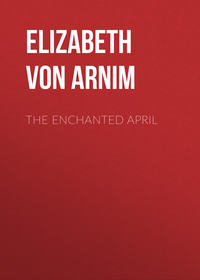 полная версия
полная версияIn the Mountains
August 22nd.
Impetuosity sometimes gets the better of me, and out begins to rush a question; but up to now I have succeeded in catching it and strangling it before it is complete. For perhaps my new friends have been very unhappy, just as I have been very unhappy, and they may be struggling out of it just as I am, still with places in their memories that hurt too much for them to dare to touch. Perhaps it is only by silence and reserve that they can manage to be brave.
There are no signs, though, of anything of the sort on their composed faces; but then neither, I think, would they see any signs of such things on mine. The moment as it passes is, I find, somehow a gay thing. Somebody says something amusing, and I laugh; somebody is kind, and I am happy. Just the smell of a flower, the turn of a sentence, anything, the littlest thing, is enough to make the passing moment gay to me. I am sure my guests can't tell by looking at me that I have ever been anything but cheerful; and so I, by looking at them, wouldn't be able to say that they have ever been anything but composed,—Mrs. Barnes composed and grave, Mrs. Jewks composed and smiling.
But I refuse now to jump at conclusions in the nimble way I used to. Even about Mrs. Barnes, who would seem to be an untouched monument of tranquillity, a cave of calm memories, I can no longer be sure. And so we sit together quietly on the terrace, and are as presentable as so many tidy, white-curtained houses in a decent street. We don't know what we've got inside us each of disorder, of discomfort, of anxieties. Perhaps there is nothing; perhaps my friends are as tidy and quiet inside as out. Anyhow up to now we have kept ourselves to ourselves, as Mrs. Barnes would say, and we make a most creditable show.
Only I don't believe in that keeping oneself to oneself attitude. Life is too brief to waste any of it being slow in making friends. I have a theory—Mrs. Barnes isn't the only one of us three who has theories—that reticence is a stuffy, hampering thing. Except about one's extremest bitter grief, which is, like one's extremest joy of love, too deeply hidden away with God to be told of, one should be without reserves. And if one makes mistakes, and if the other person turns out to have been unworthy of being treated frankly and goes away and distorts, it can't be helped,—one just takes the risk. For isn't anything better than distrust, and the slowness and selfish fear of caution? Isn't anything better than not doing one's fellow creatures the honour of taking it for granted that they are, women and all, gentlemen? Besides, how lonely....
August 23rd.
The sun goes on blazing, and we go on sitting in the shade in a row.
Mrs. Barnes does a great deal of knitting. She knits socks for soldiers all day. She got into this habit during the war, when she sent I don't know how many pairs a year to the trenches, and now she can't stop. I suppose these will go to charitable institutions, for although the war has left off there are, as Mrs. Jewks justly said, still legs in the world.
This remark I think came under the heading Dolly in Mrs. Barnes's mind, for she let her glance rest a moment on her sister in a kind of affectionate concern.
Mrs. Jewks hasn't said much yet, but each time she has said anything I have liked it. Usually she murmurs, almost as if she didn't want Mrs. Barnes to hear, yet couldn't help saying what she says. She too knits, but only, I think, because her sister likes to see her sitting beside her doing it, and never for long at a time. Her chief occupation, I have discovered, is to read aloud to Mrs. Barnes.
This wasn't done in my presence the first four days out of consideration for me, for everybody doesn't like being read to, Mrs. Barnes explained afterwards; but they went upstairs after lunch to their rooms,—to sleep, as I supposed, knowing how well they do that, and it was only gradually that I realised, from the monotonous gentle drone coming through the window to where I lay below on the grass, that it wasn't Mrs. Barnes giving long drawn-out counsel to Mrs. Jewks on the best way to cope with the dangers of being Dolly, but that it was Mrs. Jewks reading aloud.
After that I suggested they should do this on the terrace, where it is so much cooler than anywhere else in the afternoon; so now, reassured that it in no way disturbs me—Mrs. Barnes's politeness and sense of duty as a guest never flags for a moment—this is what happens, and it happens in the mornings also. For, says Mrs. Barnes, how much better it is to study what persons of note have said than waste the hours of life saying things oneself.
They read biographies and histories, but only those, I gather, that are not recent; and sometimes, Mrs. Barnes said, they lighten what Mrs. Jewks described in a murmur as these more solid forms of fiction by reading a really good novel.
I asked Mrs. Barnes with much interest about the novel. What were the really good ones they had read? And I hung on the answer, for here was something we could talk about that wasn't either the situation or the view and yet was discreet.
'Ah,' she said, shaking her head, 'there are very few really good novels. We don't care, of course, except for the very best, and they don't appear to be printed nowadays.'
'I expect the very best are unprintable,' murmured Mrs. Jewks, her head bent over her knitting, for it was one of the moments when she too was engaged on socks.
'There used to be very good novels,' continued Mrs. Barnes, who hadn't I think heard her, 'but of recent years they have indeed been few. I begin to fear we shall never again see a Thackeray or a Trollope. And yet I have a theory—and surely these two writers prove it—that it is possible to be both wholesome and clever.'
'I don't want to see any more Thackerays and Trollopes,' murmured Mrs. Jewks. 'I've seen them. Now I want to see something different.'
This sentence was too long for Mrs. Barnes not to notice, and she looked at me as one who should say, 'There. What did I tell you? Her name unsettles her.'
There was a silence.
'Our father,' then said Mrs. Barnes, with so great a gravity of tone that for a moment I thought she was unaccountably and at eleven o'clock in the morning going to embark on the Lord's Prayer, 'knew Thackeray. He mixed with him.'
And as I wasn't quite sure whether this was a rebuke for Dolly or information for me, I kept quiet.
As, however, Mrs. Barnes didn't continue, I began to feel that perhaps I was expected to say something. So I did.
'That,' I said, 'must have been very—'
I searched round for an enthusiastic word, but couldn't find one. It is unfortunate how I can never think of any words more enthusiastic than what I am feeling. They seem to disappear; and urged by politeness, or a desire to please, I frantically hunt for them in a perfectly empty mind. The nearest approach to one that I found this morning was Enjoyable. I don't think much of Enjoyable. It is a watery word; but it was all I found, so I said it. 'That must have been very enjoyable,' I said; and even I could hear that my voice was without excitement.
Mrs. Jewks looked at me and smiled.
'It was more than enjoyable,' said Mrs. Barnes, 'it was elevating. Dolly used to feel just as I do about it,' she added, her eye reproachfully on her sister. 'It is not Thackeray's fault that she no longer does.'
'It's only because I've finished with him,' said Mrs. Jewks apologetically. 'Now I want something different.'
'Dolly and I,' explained Mrs. Barnes to me, 'don't always see alike. I have a theory that one doesn't finish with the Immortals.'
'Would you put Thackeray—' I began diffidently.
Mrs. Barnes stopped me at once.
'Our father,' she said—again my hands instinctively wanted to fold—'who was an excellent judge, indeed a specialist if I may say so, placed him among the Immortals. Therefore I am content to leave him there.'
'But isn't that filial piety rather than—' I began again, still diffident but also obstinate.
'In any case,' interrupted Mrs. Barnes, raising her hand as though I were the traffic, 'I shall never forget the influence he and the other great writers of the period had upon the boys.'
'The boys?' I couldn't help inquiring, in spite of this being an interrogation.
'Our father educated boys. On an unusual and original system. Being devoid of the classics, which he said was all the better because then he hadn't to spend any time remembering them, he was a devoted English linguist. Accordingly he taught boys English,—foreign boys, because English boys naturally know it already, and his method was to make them minutely acquainted with the great novels,—the great wholesome novels of that period. Not a French, or Dutch, or Italian boy but went home—'
'Or German,' put in Mrs. Jewks. 'Most of them were Germans.'
Mrs. Barnes turned red. 'Let us forget them,' she said, with a wave of her hand. 'It is my earnest desire,' she continued, looking at me, 'to forget Germans.'
'Do let us,' I said politely.
'Not one of the boys,' she then went on, 'but returned to his country with a knowledge of the colloquial English of the best period, and of the noble views of that period as expressed by the noblest men, unobtainable by any other method. Our father called himself a Non-Grammarian. The boys went home knowing no rules of grammar, yet unable to talk incorrectly. Thackeray himself was the grammar, and his characters the teachers. And so was Dickens, but not quite to the same extent, because of people like Sam Weller who might have taught the boys slang. Thackeray was immensely interested when our father wrote and told him about the school, and once when he was in London he invited him to lunch.'
Not quite clear as to who was in London and which invited which, I said, 'Who?'
'It was our father who went to London,' said Mrs. Barnes, 'and was most kindly entertained by Thackeray.'
'He went because he wasn't there already,' explained Mrs. Jewks.
'Dolly means,' said Mrs. Barnes, 'that he did not live in London. Our father was an Oxford man. Not in the narrow, technical meaning that has come to be attached to the term, but in the simple natural sense of living there. It was there that we were born, and there that we grew up in an atmosphere of education. We saw it all round us going on in the different colleges, and we saw it in detail and at first hand in our own home. For we too were brought up on Thackeray and Dickens, in whom our father said we would find everything girls needed to know and nothing that, they had better not.'
'I used to have a perfect itch,' murmured Mrs. Jewks, 'to know the things I had better not.'
And Mrs. Barnes again looked at me as one who should say, 'There. What did I tell you? Such a word, too. Itch.'
There was a silence. I could think of nothing to say that wouldn't appear either inquisitive or to be encouraging Dolly.
Mrs. Barnes sits between us. This arrangement of our chairs on the grass happened apparently quite naturally the first day, and now has become one that I feel I mustn't disturb. For me to drop into the middle chair would somehow now be impossible. It is Mrs. Barnes's place. Yet I do want to sit next to Mrs. Jewks and talk to her. Or better still, go for a walk with her. But Mrs. Barnes always goes for the walks, either with or without me, but never without Mrs. Jewks. She hasn't yet left us once alone together. If anything needs fetching it is Mrs. Jewks who fetches it. They don't seem to want to write letters, but if they did I expect they would both go in to write them at the same time.
I do think, though, that we are growing a little more intimate. At least to-day we have talked of something that wasn't the view. I shouldn't be surprised if in another week, supposing the hot weather lasts so long, I shall be asking Mrs. Barnes outright what it is Dolly did that has apparently so permanently unnerved her sister.
But suppose she retaliated by asking me,—oh, there are so many things she could ask me that I couldn't answer! Except with the shameful, exposing answer of beginning very helplessly to cry....
August 24th.
Last night I ran after Mrs. Jewks just as she was disappearing into her room and said, 'I'm going to call you Dolly. I don't like Jewks. How do you spell it?'
'What—Dolly?' she asked, smiling.
'No—Jewks.'
But Mrs. Barnes came out of her bedroom and said, 'Did we forget to bid you goodnight? How very remiss of us.'
And we all smiled at each other, and went into our rooms, and shut the doors.
August 25th.
The behaviour of time is a surprising thing. I can't think how it manages to make weeks sometimes seem like minutes and days sometimes seem like years. Those weeks I was here alone seemed not longer than a few minutes. These days since my guests came seem to have gone on for months.
I suppose it is because they have been so tightly packed. Nobody coming up the path and seeing the three figures sitting quietly on the terrace, the middle one knitting, the right-hand one reading aloud, the left-hand one sunk apparently in stupor, would guess that these creatures' days were packed. Many an honest slug stirred by creditable desires has looked more animate than we. Yet the days are packed. Mine, at any rate, are. Packed tight with an immense monotony.
Every day we do exactly the same things: breakfast, read aloud; lunch, read aloud; tea, go for a walk; supper, read aloud; exhaustion; bed. How quick and short it is to write down, and how endless to live. At meals we talk, and on the walk we talk, or rather we say things. At meals the things we say are about food, and on the walk they are about mountains. The rest of the time we don't talk, because of the reading aloud. That fills up every gap; that muzzles all conversation.
I don't know whether Mrs. Barnes is afraid I'll ask questions, or whether she is afraid Dolly will start answering questions that I haven't asked; I only know that she seems to have decided that safety lies in putting an extinguisher on talk. At the same time she is most earnest in her endeavours to be an agreeable guest, and is all politeness; but so am I, most earnest for my part in my desire to be an agreeable hostess, and we are both so dreadfully polite and so horribly considerate that things end by being exactly as I would prefer them not to be.
For instance, finding Merivale—it is Merivale's History of the Romans under the Empire that is being read—finding him too much like Gibbon gone sick and filled with water, a Gibbon with all the kick taken out of him, shorn of his virility and his foot-notes, yesterday I didn't go and sit on the terrace after breakfast, but took a volume of the authentic Gibbon and departed by the back door for a walk.
It is usually, I know, a bad sign when a hostess begins to use the back door, but it wasn't a sign of anything in this case except a great desire to get away from Merivale. After lunch, when, strengthened by my morning, I prepared to listen to some more of him, I found the chairs on the terrace empty, and from the window of Mrs. Barnes's room floated down the familiar muffled drone of the first four days.
So then I went for another walk, and thought. And the result was polite affectionate protests at tea-time, decorated with some amiable untruths about domestic affairs having called me away—God forgive me, but I believe I said it was the laundress—and such real distress on Mrs. Barnes's part at the thought of having driven me off my own terrace, that now so as to shield her from thinking anything so painful to her I must needs hear Merivale to the end.
'Dolly,' I said, meeting her by some strange chance alone on the stairs going down to supper—invariably the sisters go down together—'do you like reading aloud?'
I said it very quickly and under my breath, for at the bottom of the stairs would certainly be Mrs. Barnes.
'No,' she said, also under her breath.
'Then why do you do it?'
'Do you like listening?' she whispered, smiling.
'No,' I said.
'Then why do you do it?'
'Because—' I said. 'Well, because—'
She nodded and smiled. 'Yes,' she whispered, 'that's my reason too.'
August 26th.
All day to-day I have emptied myself of any wishes of my own and tried to be the perfect hostess. I have given myself up to Mrs. Barnes, and on the walk I followed where she led, and I made no suggestions when paths crossed though I have secret passionate preferences in paths, and I rested on the exact spot she chose in spite of knowing there was a much prettier one just round the corner, and I joined with her in admiring a view I didn't really like. In fact I merged myself in Mrs. Barnes, sitting by her on the mountain side in much the spirit of Wordsworth, when he sat by his cottage fire without ambition, hope or aim.
August 27th.
The weather blazes along in its hot beauty. Each morning, the first thing I see when I open my eyes is the great patch of golden light on the wall near my bed that means another perfect day. Nearly always the sky is cloudless—a deep, incredible blue. Once or twice, when I have gone quite early to my window towards the east, I have seen what looked to my sleepy eyes like a flock of little angels floating slowly along the tops of the mountains, or at any rate, if not the angels themselves, delicate bright tufts of feathers pulled out of their wings. These objects, on waking up more completely, I have perceived to be clouds; and then I have thought that perhaps that day there would be rain. But there never has been rain.
The clouds have floated slowly away to Italy, and left us to another day of intense, burning heat.
I don't believe the weather will ever break up. Not, anyhow, for a long time. Not, anyhow, before I have heard Merivale to the end.
August 28th.
In the morning when I get up and go and look out of my window at the splendid east I don't care about Merivale. I defy him. And I make up my mind that though my body may be present at the reading of him so as to avoid distressing Mrs. Barnes and driving her off the terrace—we are minute in our care not to drive each other off the terrace—my ears shall be deaf to him and my imagination shall wander. Who is Merivale, that he shall burden my memory with even shreds of his unctuous imitations? And I go down to breakfast with a fortified and shining spirit, as one who has arisen refreshed and determined from prayer, and out on the terrace I do shut my ears. But I think there must be chinks in them, for I find my mind is much hung about, after all, with Merivale. Bits of him. Bits like this.
Propertius is deficient in that light touch and exquisitely polished taste which volatilize the sensuality and flattery of Horace. The playfulness of the Sabine bard is that of the lapdog, while the Umbrian reminds us of the pranks of a clumsier and less tolerated quadruped.
This is what you write if you want to write like Gibbon, and yet remain at the same time a rector and chaplain to the Speaker of the House of Commons; and this bit kept on repeating itself in my head like a tune during luncheon to-day. It worried me that I couldn't decide what the clumsier and less tolerated quadruped was.
'A donkey,' said Mrs. Jewks, on my asking my guests what they thought.
'Surely yes—an ass,' said Mrs. Barnes, whose words are always picked.
'But why should a donkey be less tolerated than a lapdog?' I asked. 'I would tolerate it more. If I might tolerate only one, it would certainly be the donkey.'
'Perhaps he means a flea,' suggested Mrs. Jewks.
'Dolly,' said Mrs. Barnes.
'But fleas do go in for pranks, and are less tolerated than lapdogs,' said Mrs. Jewks.
'Dolly,' said Mrs. Barnes again.
'Except that,' I said, not heeding Mrs. Barnes for a moment in my pleasure at having got away from the usual luncheon-table talk of food, 'haven't fleas got more than four legs?'
'That's centipedes,' said Dolly.
'Then it's two legs that they've got.'
'That's birds,' said Dolly.
We looked at each other and began to laugh. It was the first time we had laughed, and once we had begun we laughed and laughed, in that foolish way one does about completely idiotic things when one knows one oughtn't to and hasn't for a long while.
There sat Mrs. Barnes, straight and rocky, with worried eyes. She never smiled; and indeed why should she? But the more she didn't smile the more we laughed,—helplessly, ridiculously. It was dreadful to laugh, dreadful to mention objects that distressed her as vulgar; and because it was dreadful and we knew it was dreadful, we couldn't stop. So was I once overcome with deplorable laughter in church, only because a cat came in. So have I seen an ill-starred woman fall a prey to unseasonable mirth at a wedding. We laughed positively to tears. We couldn't stop. I did try to. I was really greatly ashamed. For I was doing what I now feel in all my bones is the thing Mrs. Barnes dreads most,—I was encouraging Dolly.
Afterwards, when we had settled down to Merivale, and Dolly finding she had left the book upstairs went in to fetch it, I begged Mrs. Barnes to believe that I wasn't often quite so silly and didn't suppose I would be like that again.
She was very kind, and laid her hand for a moment on mine,—such a bony hand, marked all over, I thought as I looked down at it, with the traces of devotion and self-sacrifice. That hand had never had leisure to get fat. It may have had it in the spacious days of Mr. Barnes, but the years afterwards had certainly been lean ones; and since the war, since the selling of her house and the beginning of the evidently wearing occupation of what she had called standing by Dolly, the years, I understand, have been so lean that they were practically bone.
'I think,' she said, 'I have perhaps got into the way of being too serious. It is because Dolly, I consider, is not serious enough. If she were more so I would be less so, and that would be better for us both. Oh, you musn't suppose,' she added, 'that I cannot enjoy a joke as merrily as anybody.' And she smiled broadly and amazingly at me, the rockiest, most determined smile.
'There wasn't any joke, and we were just absurd,' I said penitently, in my turn laying my hand on hers. 'Forgive me. I'm always sorry and ashamed when I have behaved as though I were ten. I do try not to, but sometimes it comes upon one unexpectedly—'
'Dolly is a little old to behave as though she were ten,' said Mrs. Barnes, in sorrow rather than in anger.
'And I'm a little old too. It's very awkward when you aren't so old inside as you are outside. For years I've been trying to be dignified, and I'm always being tripped up by a kind of apparently incurable natural effervescence.'
Mrs. Barnes looked grave.
'That is what is the matter with Dolly,' she said. 'Just that. How strange that you should have met. For it isn't usual. I cannot believe it is usual. All her troubles have been caused by it. I do not, however, regard it as incurable. On the contrary—I have helped her to check it, and she is much better than she was.'
'But what are you afraid she will do now?' I asked; and Dolly, coming out with, the book under her arm and that funny little air of jauntiness that triumphs when she walks over her sobering black skirt and white cotton petticoat, prevented my getting an answer.
But I felt in great sympathy with Mrs. Barnes. And when, starting for our walk after tea, something happened to Dolly's boot—I think the heel came off—and she had to turn back, I gladly went on alone with her sister, hoping that perhaps she would continue to talk on these more intimate lines.
And so she did.
'Dolly,' she said almost immediately, almost before we had got round the turn of the path, 'is the object of my tenderest solicitude and love.'
'I know. I see that,' I said, sympathetically.
'She was the object of my love from the moment when she was laid, a new born baby, in the arms of the little ten year old girl I was then, and she became, as she grew up and developed the characteristics I associate with her name, the object of my solicitude. Indeed, of my concern.'
'I wish,' I said, as she stopped and I began to be afraid this once more was to be all and the shutters were going to be shut again, 'we might be real friends.'
'Are we not?' asked Mrs. Barnes, looking anxious, as though she feared she had failed somewhere in her duties as a guest.









